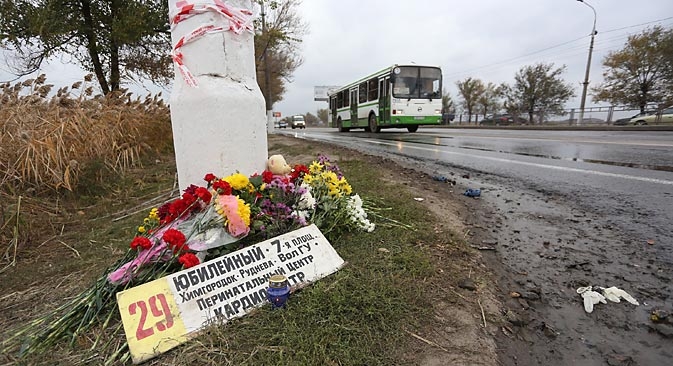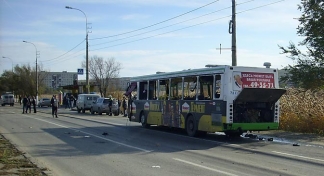Volgograd bus bomber was trying to reach Moscow

The Monday explosion claimed the lives of six people and left another 36 injured. Source: RIA Novosti
The terrorist attack in southern Russia's Volgograd was committed by a woman who had already been under security service surveillance for a long time.
According to her relatives, the perpetrator had been suffering from severe disorders and was extremely absorbed in religion.
Representatives from law enforcement agencies say that today's terrorists are mostly young people, who are recruited through the Internet and do not resemble criminals at all.
Russia's Investigation Committee and the police continued investigating Volgograd's bus bombing on Tuesday, Oct. 22. According to Vladimir Markin, official representative of the Investigation Committee, as of Oct. 21, investigators had questioned 50 witnesses about the terrorist act.
Video of the explosion (in Russian). Source: YouTube
It has been established that the alleged terrorist Naida Asiyalova came to Volgograd from Makhachkala on a regular bus headed toward Moscow.
For a reason still unknown, Asiyalova exited the bus near Volgograd's MIA Academy, approximately an hour before the explosion.
Right now, specialists say that the force of explosion was not as high as the media reports; it was nearly 500–600 grams in trinitrotoluol equivalent, with a bomb that consisted of bolts. This information has not yet been confirmed.
Investigation officers have established that Asiyalova bought a bus ticket to Moscow via Volgograd. Having practically left Volgograd, she decided to leave the bus and return back to the center of Volgograd. It is not yet known if this was planned, or if Asiyalova had a change of plans.
According to sources in special services, it is possible that the alleged bomber obtained her explosive bomb in Volgograd, not in Makhachkala.
It would have been too risky to bring the device all the way from Makhachkala, due to the fact that it could have been detected during a pat-down search during boarding.
Such security procedures are very common in Makhachkala and have been practiced there for a rather long time.
Asiyalova and her crime associates have been under the radar of Russian special services for a long time, as well. There is information that her future had already been laid out for her — either arrest or assassination.
The issue was quite urgent and counted in days, if not in hours. Asiyalova was aware that there was a manhunt out for her, and she never stayed in the same place for too long.
Special services say that criminal gangs have been suffering from labor scarcity over the last few years: All the outlaws have either already been assassinated or are sitting in jail.
This is why modern "religious fighters" are students and sometimes even scholars. Most of them are recruited through the Internet.
Information that the suicide bomber who blew up the bus in Volgograd was from their hometown shocked the residents of a small, 2,500-person,Guniba Mountain settlement in Dagestan, in southern Russia.
“I have known this family for quite a long time,” says the Asiyalov family's neighbor,PatimatNazhmudinova, who works as an editor at a local newspaper.
Related:
Mother of Volgograd bus bomber says daughter put on hijab after marrying ethnic Russian man
Volgograd bus bomb was equivalent to 2-3 kilograms of TNT - source
“Their house is rather small. Ravzat Asiyalova, the terrorist's mother, has been living alone since her daughters moved away. She works; she is a mail carrier. Naida had lived in an orphan home until she turned 5 years old. Nobody knew that Ravzat had given birth to her and had given her up. When the orphan home closed in the ‘80s, her grandfather received a letter stating that he had a young granddaughter — so he took her into his home.”
Naida left her home village a long time ago. She was not very religious at the time; it all started only three years ago. In Dagestan's villages, most inhabitants are religious, but they don't actually impose their beliefs on anybody.
They do not tell people who they should believe in and how. As for Naida, she was doing the exact opposite. In the end, her father publically turned away from her.
“Later, her mother traveled to Moscow to attend her wedding. She was very proud that Naida's husband was a good man, a Turk,” the neighbors say. “Naida had some problems with her health. Her Turkish husband had paid for her expensive dental treatment.”
However, at the dentist's office or someplace else, Naida caught a bad infection and her new teeth started hurting. She had her dental crowns removed, because of the severity of the infection; someone even mentioned a sarcoma, which makes bones rot.
Shortly after this, her husband filed for a divorce. She did not have any money for survival, let alone medical treatment. She tried to collect money through social networks.
Neighbors think that terrorists saw her cries for help in social networks and helped her with obtaining her medicine, recruiting her at the same time.
Among the fighters, Asiyalova took a second, Muslim name — Amaturakhman. Her second husband, a Russian, was a criminalknown by the nickname "Giraffe."
Naida met her second husband, Dmitry Sokolov, in Russia, while learning Arabic. Dmitry converted to Islam and became a rather active member of Makhachkala's criminal gang, working as a bomb technician.
Law enforcement agencies sayDmitry, who took the name Abdul Jabbar, made the bombs that were used by the terrorist MadinaAliyeva during the store bombings in Makhachkala.
During that bombing, one person tragically died and 15 were injured, according to a source in Dagestan's security agencies.
First published in Russian in Rossiyskaya Gazeta.
All rights reserved by Rossiyskaya Gazeta.
Subscribe
to our newsletter!
Get the week's best stories straight to your inbox

